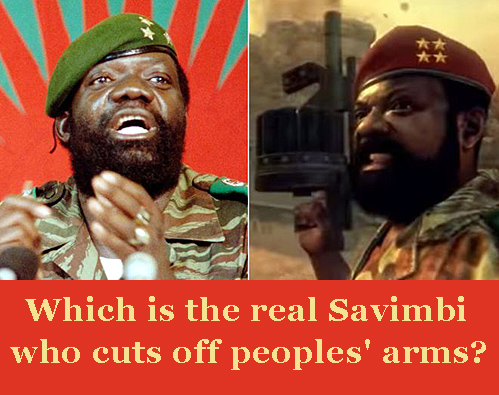 What’s the difference between a video game and a terrorist?
What’s the difference between a video game and a terrorist?
The family of a controversial Angolan rebel leader who died in 2002 is suing the manufacturer of the “Call of Duty” video game for defaming Jonas Sivimbi.
I interviewed Sivimbi in Paris when I was covering the Paris Peace talks (on Vietnam) for several U.S. newspapers. Back then in the 1970s he was a hero to the independence movement as well as the South African anti-apartheid movement, since South Africa was at the time fighting the independence movement in Angola.
Subsequent to my brief acquaintance, though, Savimbi’s reputation declined substantially.
Independence was won by a rival rebel group, MPLA, from Portugal in 1975, and though initially Savimbi was a part of the overall peace process, he immediately started a brutal civil war against the MPLA that lasted virtually until the moment he was killed by government soldiers in 2002.
During that civil war he grew vicious becoming the first warlord to finance his battle with blood diamonds. UNITA and Savimbi were ultimately investigated for war crimes by The Hague.
“Call of Duty” features Savimbi, or for sure someone who looks (and acts) the spitting image.
In answering the Savimbi family suit, the French creator and owner of “Call of Duty” claimed that Savimbi-in-the-game was actually shown in a “favorable light” and a “good guy who comes to help the heroes.”
Seeking 100 million Euros, Savimbi’s now 42-year old son said, “Seeing him kill people, cutting someone’s arm off … that’s not like Papa.”
I haven’t looked at the game. I can’t stand media violence and I know that “Call of Duty” is one of the worst.
NPR featured “Call of Duty” in its series of violence in video games in 2013 as at the time the most popular and most violent.
UNITA is now a franchised part of peaceful Angolan society, and they are encouraging – possibly joining – the Savimbi family in their suit.
The line between moral freedom fighters and amoral terrorists is thin. But there is no division at all between the violence of a video game and the violence promoted by today’s jihadists.
Games targeted to teenagers who have yet to fully develop their moral compass strikes me as one of the most barbaric outcomes of crass capitalism.
Ratings are only rarely useful and require parents or guardians actually capable of enforcing them.
If Republican candidates will blithely suggest carpet bombing the Levant, I guess it’s not radical for me to suggest that video games like “Call of Duty” should be banned.
I’ve no loyalty to my brief encounter with Savimbi, who at the time was a gentle, highly respected and admired grass roots leader. He turned, and so did a bunch of kids from Minneapolis who participated in the Westgate Mall attack and dozens of others from America who appear on jihadist videos.
Carpet bombing them simply cleans the field for new faces. Getting rid of their platform is the only way to end the game.

